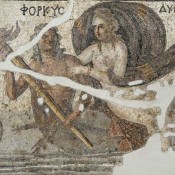A mosaic depicting a pair of lovers in an erotic scene has been returned to the Archaeological Park of Pompeii by the Carabinieri Cultural Heritage Protection Command. The piece was repatriated from Germany through a diplomatic expedition arranged by the Consulate General of Italy in Stuttgart.
The mosaic had originally been given as a gift to a German citizen by a Wehrmacht captain, who had been in charge of military supply chains in Italy during World War II. The captain’s heirs later handed it over to the TPC (Cultural Heritage Protection Unit) in Rome. The official return to the Archaeological Park of Pompeii—where the Italian Ministry of Culture has assigned the artifact—was carried out in the presence of General Francesco Gargaro, Commander of the Carabinieri Cultural Heritage Protection.
The artifact is a mosaic panel, likely originating from the Vesuvian area, depicting an erotic scene. It may have once adorned the floor of a bedroom in a domus or villa.
The heirs of the last private owner contacted the Carabinieri’s TPC Unit in Rome to request guidance on how to return the mosaic to the Italian state.
Upon realizing they were dealing with an artwork likely tied to wartime looting of Italy’s national heritage, the specialized unit carried out a series of verifications regarding the artifact’s origin and arranged its repatriation.
Thanks to the cooperation of the Office for the Protection of Archaeological Heritage within the Pompeii Archaeological Park, the mosaic has been tentatively linked to the Vesuvian territory—although the exact original context remains uncertain due to lack of definitive data.
Pending further studies and analyses, the mosaic panel will be temporarily displayed at Pompeii’s Antiquarium. This allows for its preservation and protection, while also making it accessible to the public.
“Today’s handover once again confirms the Carabinieri Command’s unwavering commitment to recovering cultural heritage wrongfully located abroad,” stated General Gargaro. “This work is carried out on a daily basis thanks to a dense network of international relationships, built over the years, which allows us to operate with speed and precision.”
“Every looted artifact that returns is a wound that heals, so we express our gratitude to the protection unit for the work they have done,” said Gabriel Zuchtriegel, Director of the Pompeii Archaeological Park. “The wound lies not so much in the material value of the work but in its historical value, a value that is severely compromised by the illicit trafficking of antiquities. We don’t know the exact origin of the artifact and probably never will. We will conduct further archaeological and archaeometric analyses to confirm its authenticity and reconstruct its history as far as possible. Study, knowledge, and public enjoyment of heritage are the lotus flowers that grow on the mire of looting driven by the lust for possession and selfishness of those who steal archaeological findsfrom the community.”










